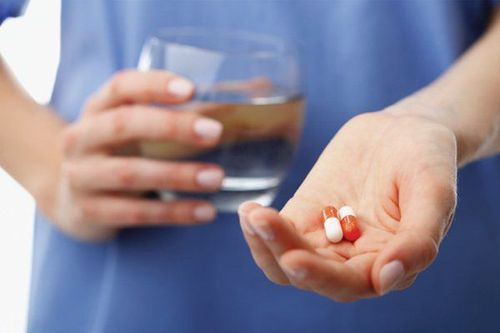This is an automatically translated article.
Brufen medicine has the main ingredient Ibuprofen, which belongs to the group of non-steroidal anti-inflammatory drugs, analgesics, antipyretics. Brufen is indicated to reduce fever in children, relieve pain in cases such as toothache or pain after tooth extraction, headache, osteoarthritis pain due to rheumatism, sprains, menstrual pain.
1. Brufen . drugs
Brufen fever-reducing medicine has the main active ingredient Ibuprofen- belongs to the group of non-steroidal anti-inflammatory drugs (NSAIDs). In addition, the drug Brufen also has a reversible inhibitory effect on platelet aggregation. This is due to the body's ability to inhibit an enzyme that is needed in the process of causing inflammation, pain, and fever.
The dosage forms of the drug can be encountered such as:
Brufen syrup 100mg/5ml 60ml bottle; Ibuprofen 400mg Tablets.
2. Effects of Brufen
Brufen is indicated for use in the following cases:
Fever in children; Pain relief in common pain cases such as toothache, pain after tooth extraction, headache, bone and joint pain due to rheumatism, sprains; In case of flu, accompanied by signs of headache. Body aches related to weather changes. Dysmenorrhea . Pharmacodynamics of Brufen:
The main active ingredient is Ibuprofen which is a non-steroidal anti-inflammatory drug (NSAID). This is a derivative of propionic acid with analgesic, anti-inflammatory and antipyretic effects. Furthermore, the active ingredient Ibuprofen has a potential for reversible inhibition of platelet aggregation. The therapeutic effect of this drug is attributed to its ability to inhibit the enzyme cyclooxygenase and thereby lead to a significant reduction in prostaglandin synthesis. These properties help reduce symptoms of inflammation such as swelling, heat, redness, pain, and fever. Pharmacokinetics of Brufen:
Absorption: Peak serum concentrations occur approximately 1-2 hours after oral administration for the rapid-release formulation. Studies including standard meals have shown that food has no appreciable effect on total bioavailability; Distribution: Distribution: Ibuprofen is strongly bound to plasma proteins (99%). Ibuprofen has a small volume of distribution, about 0.12 to 0.2 L/kg in adults; Metabolism: Following oral administration of Brufen, nearly 90% of an oral dose of ibuprofen is detectable in the urine as an oxidized metabolite and a glucuronic conjugate. Very little, the active ingredient Ibuprofen is excreted unchanged in the urine; Elimination: Elimination by the kidneys is both rapid and complete. The half-life of the rapid-release formulation of Brufen is approximately 2 hours. Elimination of the drug Ibuprofen is practically completed 24 hours after the last dose.
3. Usage and therapeutic dose of Brufen
3.1. How to take Brufen
Brufen will work faster when you take it on an empty stomach. However, for people with a history or stomach problems, Brufen should be taken after eating.
For the dosage form of Brufen 60ml syrup, shake the bottle well before use. Measure the correct dose. When taking the medicine, there may be a transient burning sensation in the mouth and throat.
3.2. Dosage for children
Use Brufen 20 - 30mg/kg/day, divided into several oral doses or use Brufen 20mg/ml suspension as follows:
Children from 3 to 6 months (about 5-7kg): Use 2.5ml syrup /time, use from 2-3 times / day; Children from 6-12 months (about 7-10kg): Use syrup 2.5ml/time, use 3 times/day; Children from 1-2 years old (about 10 - 14.5kg): Use syrup 2.5ml/time, use 3-4 times/day; Children from 3-7 years old (about 14.5-25kg): Use syrup 5ml/time, use 3-4 times/day; Children from 8-12 years old (about 25-40kg): Use syrup 10ml/time, use 3-4 times/day. Note:
Do not use Brufen 60ml for children under 3 months old and children weighing less than 5kg; Consult your doctor if your child's symptoms do not improve or get worse after 24 hours of taking the medicine. Especially using the drug for children from 3 to 5 months old; Consult a pediatrician if symptoms do not improve or symptoms worsen after 3 days of taking Brufen 60ml in children aged 6 months to 18 years.
3.3. Dosage for adults
Dosage of Brufen for adults and children 12 years and older is 200-400 mg, equivalent to 10-20ml once, 3-4 times a day.
The time between doses is at least 4 hours apart. The total therapeutic dose exceeds 1200mg in a 24-hour period.
When you have used Brufen, but the symptoms of the disease are worse or do not improve, it is necessary to consult a doctor for treatment.
3.4. If you forget to take a dose of Brufen , you need to take the missed dose as soon as you remember it. However, if the missed dose is too close to the time for your next dose, skip the missed dose and take your next dose as scheduled. You should note that absolutely should not take the supplement or take twice the prescribed dose and should not take the medicine for a long time.
4. Undesirable effects of Brufen
Brufen may cause the following undesirable effects:
Gastrointestinal ulcers (especially for people with a history of disease or risk factors); Hypersensitivity reactions such as skin allergy, urticaria, asthma, lymphedema, erythema...; Cardiovascular risk (for older people, with a history of cardiovascular disease). When drug overdose can cause drug shock, causing the body to increase the appearance of side effects and dangerous reactions to health such as:
Allergic reactions; Shortness of breath, bronchospasm; Rash, rash; Severe dizziness; Body weakness, fainting; Psychiatric disturbances such as hallucinations; Cardiovascular problems such as myocardial infarction , heart failure ; Digestive problems such as peptic ulcers, perforation and gastrointestinal bleeding. You need to stop using Brufen if you notice any unusual signs or serious side effects. At the same time, for rare adverse effects that appear and directly threaten the user's life, you need to quickly go to the hospital for emergency treatment and timely treatment. In addition, if you find that the treatment process with Brufen 60ml is not effective, your condition is getting worse, you need to completely stop using the drug and immediately report it to a specialist.
5. Interactions of Brufen Drugs Brufen drugs have the potential to interact with many other therapeutic drugs, reducing the effectiveness of each other's disease. At the same time, the drug also increases the incidence of serious side effects. You should be careful when using the following drugs together with Brufen:
Digoxin : This is a medicine to treat heart failure. When these two drugs are used together, they can aggravate heart failure, reduce the glomerular filtration rate and increase the concentration of Digoxin in the blood plasma, leading to poisoning in the body; Methotrexate: When used with Brufen, it may cause inhibition of renal tubular secretion of Methotrexate and reduce the clearance of the active substance Methotrexate; Ciclosporin: When used in combination with Brufen, there is an increased risk of nephrotoxicity; Warfarin: Brufen may increase the anticoagulant effect of drugs that cause bleeding; Other NSAIDs: Taking NSAIDs together increases the risk of peptic ulcer disease; Tacrolimus: Concomitant use of two drugs may increase the risk of nephrotoxicity; Quinolone antibiotics: When using together Brufen and Quinolone antibiotics may increase the risk of convulsions; Cardiovascular, blood pressure medications (including diuretics, ACE inhibitors, beta-channel blockers and angiotensin-II antagonists): Co-administration of these drugs with Brufen may reduce the effects of these drugs. this drug.
6. Some notes when using Brufen
6.1. Contraindications to use Brufen Do not use Brufen for the following cases:
People with hypersensitivity or hypersensitivity to the main active ingredient Ibuprofen or other excipients contained in the drug; People with a history of hypersensitivity reactions (such as asthma, rhinitis, swollen lymph nodes or urticaria) to the use of Aspirin GT or other NSAIDs; People with heart failure, liver failure; People with severe renal failure (glomerular filtration rate less than 30 mL/min); Pregnant women in the last 3 months of pregnancy; Patients with a history of gastrointestinal bleeding or perforation related to previous NSAID use; Patients with existing or history of peptic ulcer disease or recurrent gastrointestinal bleeding (at least 2 separate occasions with evidence of ulcer involvement or bleeding); People with severe dehydration (due to vomiting, diarrhea or inadequate rehydration). 6.2. How to store Brufen You should store Brufen in a cool, dry place, with a room temperature of 25 - 30 degrees Celsius; For Brufen 60ml oral suspension, users need to close the lid and store it in the medicine box; For Brufen tablets, users need to store the drug in the package or box. At the same time, you should not arbitrarily separate the medicine from the blister pack unless necessary; You should not store the medicine in humid places such as the refrigerator or freezer compartment, toilet; Keep Brufen out of direct sunlight, family pets and the reach of children; In case the drug Brufen has expired, you should not continue to use it. If there is a way to handle the medicine on the packaging, please handle it according to the instructions. You should not arbitrarily handle drugs through the water pipe, do not handle drugs in the toilet or throw the medicine into the natural environment. Above is the necessary information about the use, dosage and antipyretic effects of Brufen. However, pain and fever are common clinical signs of many different diseases. When you have a fever with aches and pains, you need to see a doctor to find out the cause and properly diagnose the disease.
Please dial HOTLINE for more information or register for an appointment HERE. Download MyVinmec app to make appointments faster and to manage your bookings easily.













